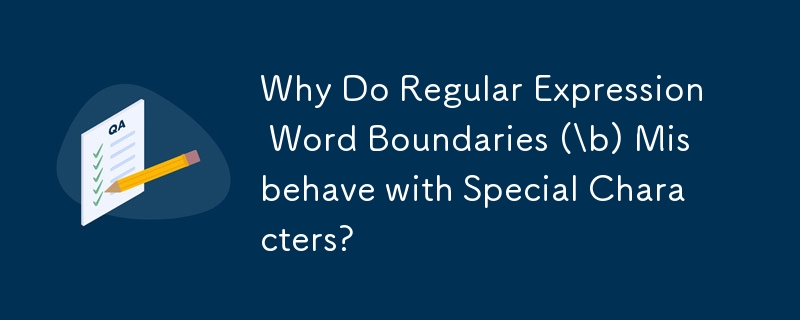

When using regular expressions to match words, the b boundary pattern can sometimes produce unexpected results, particularly when the word contains special characters.
Consider the phrase "test Sortesindex[persons]{Sortes} text." Matching the full phrase using b
Formally, b matches the boundary between a word character (w) and a non-word character (W), or the beginning/end of the string. When the word boundary pattern is immediately followed by a special character like [ or }, the b only requires a word character after the special character.
To address this issue, adaptive word boundaries or unambiguous word boundaries can be used.
Adaptive word boundaries handle any combination of word and non-word characters on either side of the pattern:
re.search(r'(?:(?!\w)|\b(?=\w)){}(?:(?<=\w)\b|(?<!\w))'.format(re.escape('Sortes\index[persons]{Sortes}')), 'test Sortes\index[persons]{Sortes} test')Unambiguous word boundaries require no word characters on either side of the pattern:
re.search(r'(?<!\w){}(?!\w)'.format(re.escape('Sortes\index[persons]{Sortes}')), 'test Sortes\index[persons]{Sortes} test')Adaptive word boundaries are more versatile but allow leading and trailing non-word characters. Unambiguous word boundaries are stricter, ensuring no surrounding word characters.
The lookaround patterns used for adaptive and unambiguous word boundaries can be customized based on the specific requirements of the matching task. For instance, to only match non-letters around the pattern, use [^Wd_] instead of w.
The above is the detailed content of Why Do Regular Expression Word Boundaries (\b) Misbehave with Special Characters?. For more information, please follow other related articles on the PHP Chinese website!
 How to enter safe mode on laptop
How to enter safe mode on laptop
 Is the matcha platform formal?
Is the matcha platform formal?
 Reasons why excel table cannot be opened
Reasons why excel table cannot be opened
 Compare the similarities and differences between two columns of data in excel
Compare the similarities and differences between two columns of data in excel
 vscode Chinese setting method
vscode Chinese setting method
 My computer can't open it by double-clicking it.
My computer can't open it by double-clicking it.
 Data Structure and Algorithm Tutorial
Data Structure and Algorithm Tutorial
 Solution to the problem that the input is not supported when the computer starts up
Solution to the problem that the input is not supported when the computer starts up




